
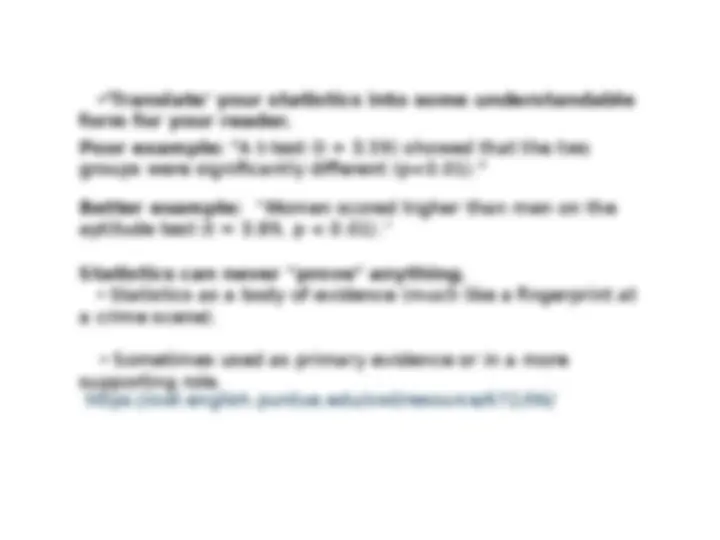
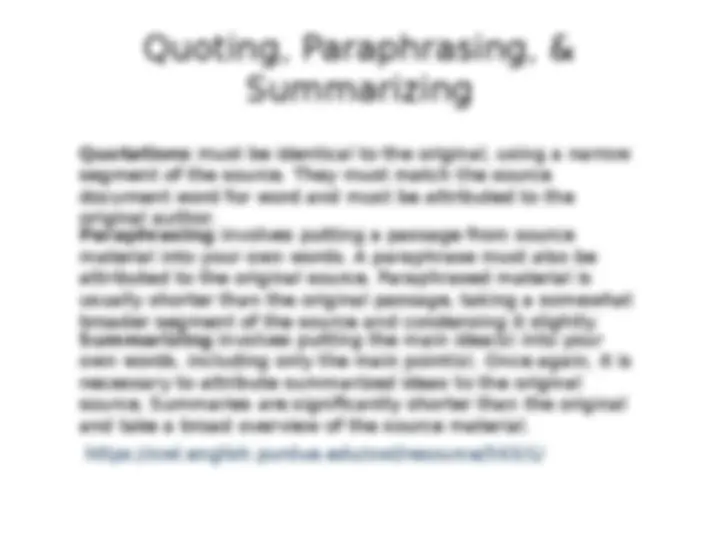
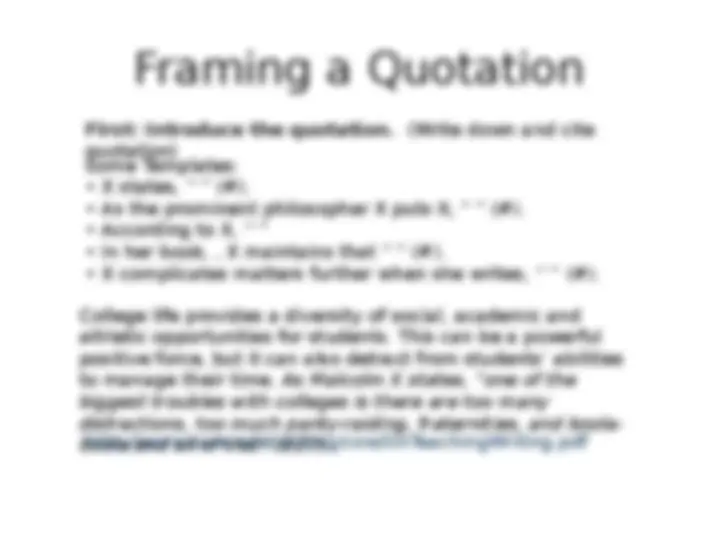
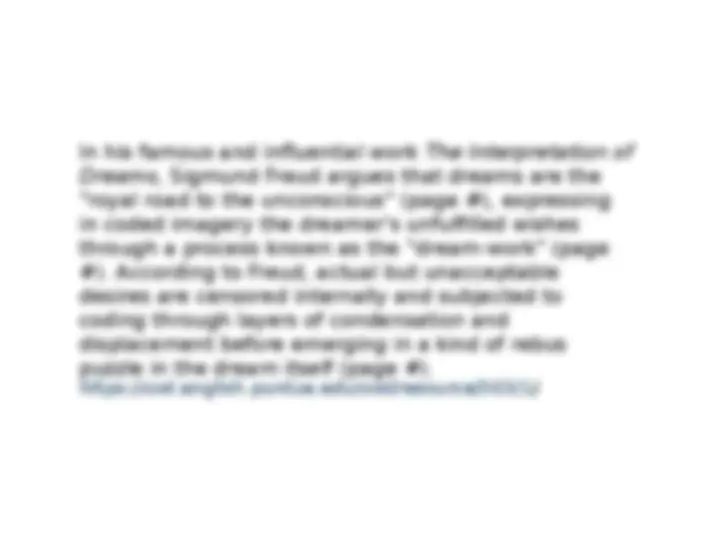
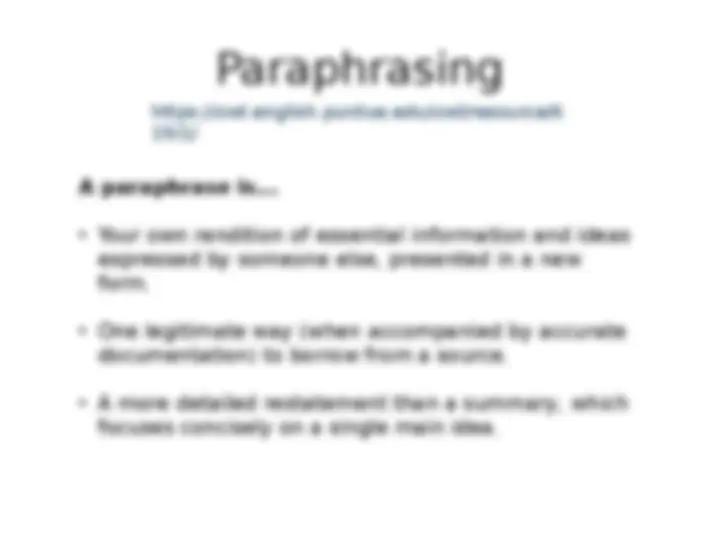
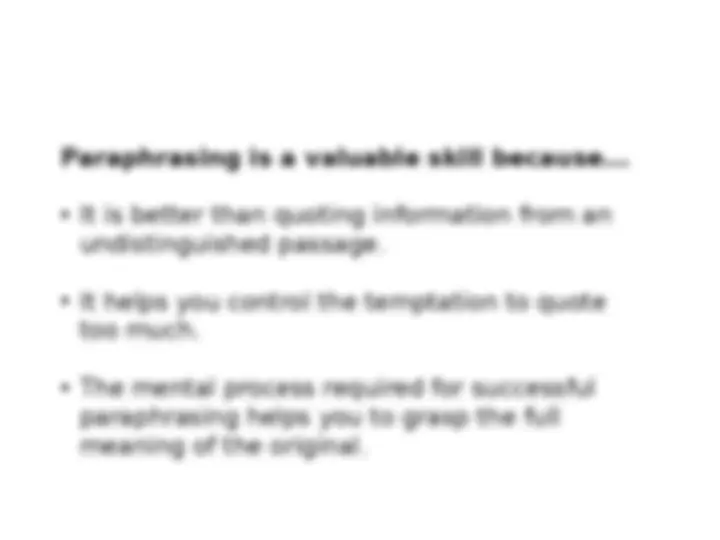
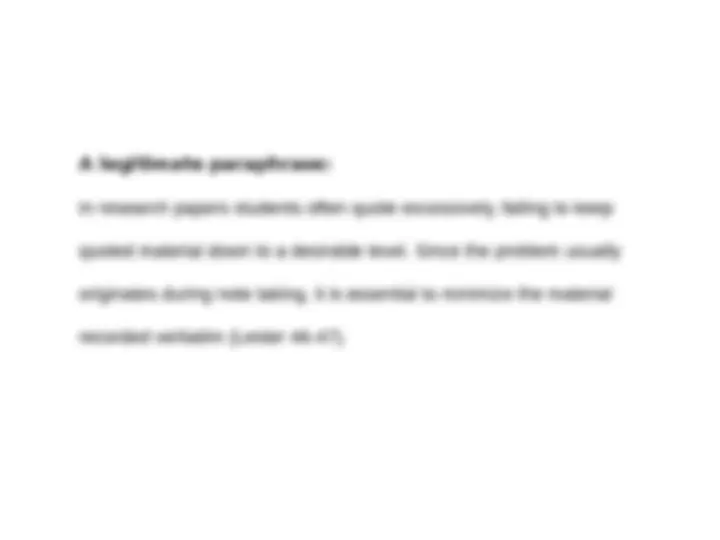
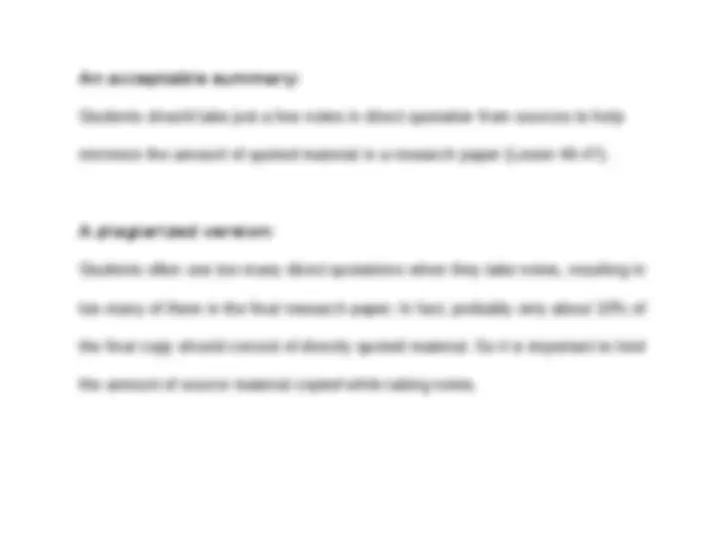
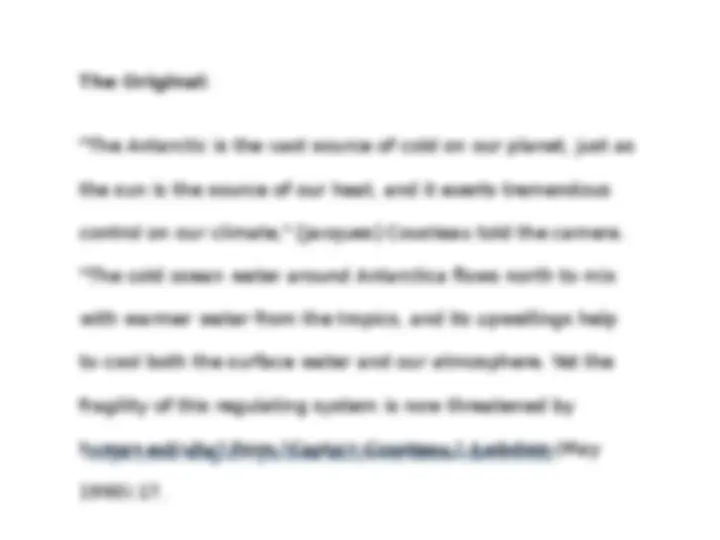
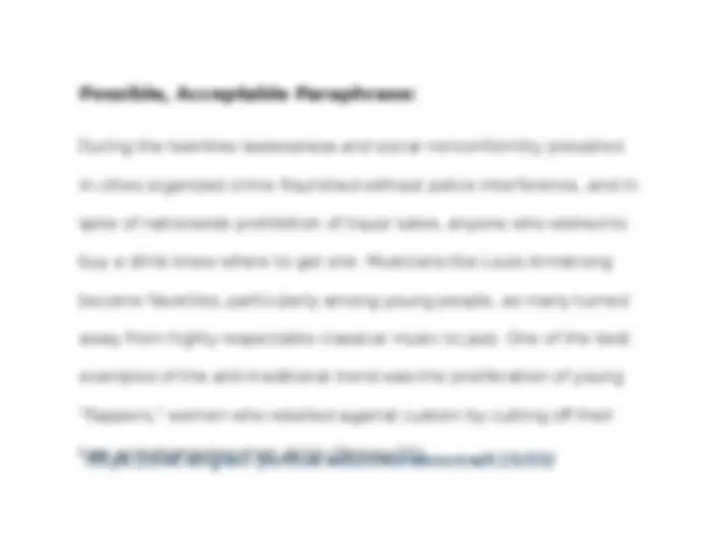
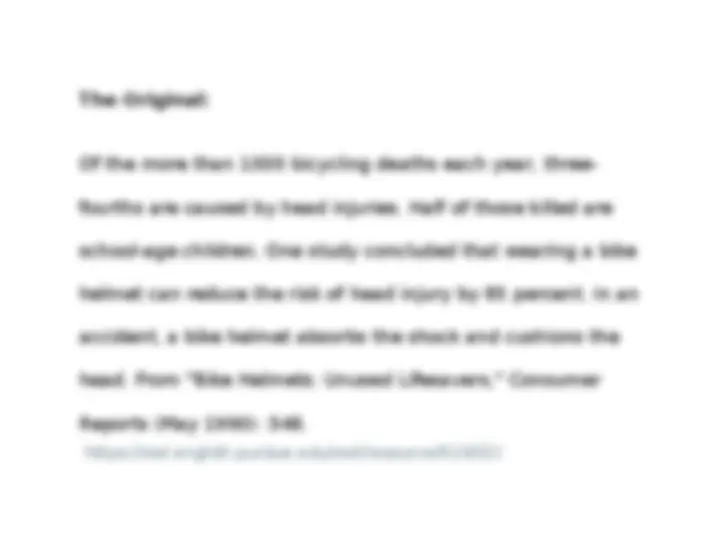
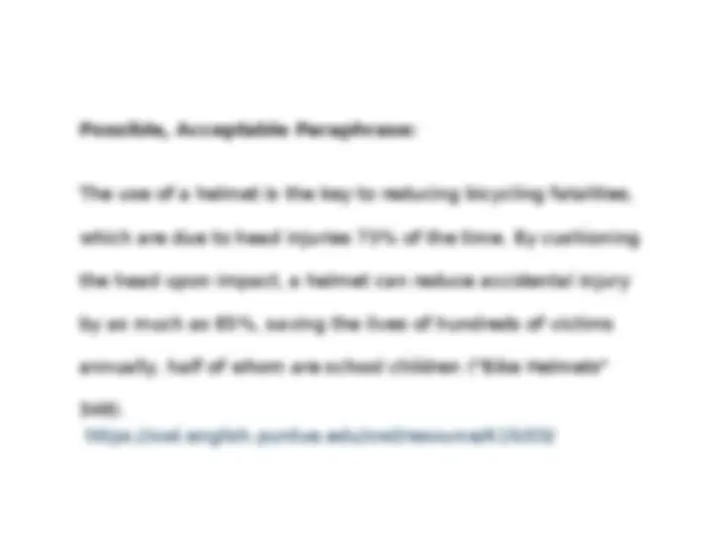


Study with the several resources on Docsity

Earn points by helping other students or get them with a premium plan


Prepare for your exams
Study with the several resources on Docsity

Earn points to download
Earn points by helping other students or get them with a premium plan
Community
Ask the community for help and clear up your study doubts
Discover the best universities in your country according to Docsity users
Free resources
Download our free guides on studying techniques, anxiety management strategies, and thesis advice from Docsity tutors
Guidelines on using statistics and quotations in academic writing. It emphasizes the importance of using reliable sources, providing proper attribution, and understanding the limitations of statistics. It also explains the differences between quoting, paraphrasing, and summarizing, and provides examples and templates for each.
Typology: Lecture notes
1 / 20

This page cannot be seen from the preview
Don't miss anything!













Be wary of sources other than peer-reviewed,
academic journals or government agencies.
Provide information where the statistic came
from.
Example:
According to the United States Census Bureau, in 2000, the
ten largest cities in the U.S. comprised 54% of the total U.S.
population.
https://owl.english.purdue.edu/owl/resource/672/02/
Quotations must be identical to the original, using a narrow
segment of the source. They must match the source
document word for word and must be attributed to the
original author.
Paraphrasing involves putting a passage from source
material into your own words. A paraphrase must also be
attributed to the original source. Paraphrased material is
usually shorter than the original passage, taking a somewhat
broader segment of the source and condensing it slightly.
Summarizing involves putting the main idea(s) into your
own words, including only the main point(s). Once again, it is
necessary to attribute summarized ideas to the original
source. Summaries are significantly shorter than the original
and take a broad overview of the source material.
https://owl.english.purdue.edu/owl/resource/563/1/
First: Introduce the quotation. (Write down and cite
quotation)
Some Templates:
College life provides a diversity of social, academic and
athletic opportunities for students. This can be a powerful
positive force, but it can also detract from students’ abilities
to manage their time. As Malcolm X states, “one of the
biggest troubles with colleges is there are too many
distractions, too much panty-raiding, fraternities, and boola-
boola and all of that” (227).
http://www.case.edu/writing/csw/OnTeachingWriting.pdf
And Beyond: State the implications of the quotation
for your own argument.
College life provides a diversity of social, academic and
athletic opportunities for students. This can be a powerful
positive force, but it can also detract from students’ abilities
to manage their time. As Malcolm X states, “one of the
biggest troubles with colleges is there are too many
distractions, too much panty-raiding, fraternities, and boola-
boola and all of that” (227). In this statement, Malcolm X is
pointing out that the variety of activities that colleges offer
students can keep them from completing their academic
work. While Malcolm X is certainly right that distractions are
plentiful on college campuses, he fails to consider the
necessity of these social interactions among students.
Without the “boola-boola and all of that,” students would
miss out on an essential part of their education.
http://www.case.edu/writing/csw/OnTeachingWriting.pdf
https://owl.english.purdue.edu/owl/resource/563/1/
Paraphrasing is a valuable skill because...
undistinguished passage.
too much.
paraphrasing helps you to grasp the full
meaning of the original.
6 Steps to Effective Paraphrasing
Reread the original passage until you understand its full
meaning.
Set the original aside, and write your paraphrase on a note
card.
Jot down a few words below your paraphrase to remind you
later how you envision using this material. At the top of the
note card, write a key word or phrase to indicate the
subject of your paraphrase.
Check your rendition with the original to make sure that
your version accurately expresses all the essential
information in a new form.
Use quotation marks to identify any unique term or
phraseology you have borrowed exactly from the source.
Record the source (including the page) on your note card so
that you can credit it easily if you decide to incorporate the
A legitimate paraphrase:
In research papers students often quote excessively, failing to keep
quoted material down to a desirable level. Since the problem usually
originates during note taking, it is essential to minimize the material
recorded verbatim (Lester 46-47).
An acceptable summary:
Students should take just a few notes in direct quotation from sources to help
minimize the amount of quoted material in a research paper (Lester 46-47).
A plagiarized version:
Students often use too many direct quotations when they take notes, resulting in
too many of them in the final research paper. In fact, probably only about 10% of
the final copy should consist of directly quoted material. So it is important to limit
the amount of source material copied while taking notes.
Possible, Acceptable Paraphrase:
According to Jacques Cousteau, the activity of people in
Antarctica is jeopardizing a delicate natural mechanism that
controls the earth's climate. He fears that human activity
could interfere with the balance between the sun, the source
of the earth's heat, and the important source of cold from
Antarctic waters that flow north and cool the oceans and
atmosphere ("Captain Cousteau" 17).https://owl.english.purdue.edu/owl/resource/619/03/
The Original:
The twenties were the years when drinking was against the law, and
the law was a bad joke because everyone knew of a local bar where
liquor could be had. They were the years when organized crime ruled
the cities, and the police seemed powerless to do anything against it.
Classical music was forgotten while jazz spread throughout the land,
and men like Bix Beiderbecke, Louis Armstrong, and Count Basie
became the heroes of the young. The flapper was born in the
twenties, and with her bobbed hair and short skirts, she symbolized,
perhaps more than anyone or anything else, America's break with the
past. From Kathleen Yancey, English 102 Supplemental Guide (1989):
https://owl.english.purdue.edu/owl/resource/619/02/
The Original:
Of the more than 1000 bicycling deaths each year, three-
fourths are caused by head injuries. Half of those killed are
school-age children. One study concluded that wearing a bike
helmet can reduce the risk of head injury by 85 percent. In an
accident, a bike helmet absorbs the shock and cushions the
head. From "Bike Helmets: Unused Lifesavers," Consumer
Reports (May 1990): 348.
https://owl.english.purdue.edu/owl/resource/619/02/
Possible, Acceptable Paraphrase:
The use of a helmet is the key to reducing bicycling fatalities,
which are due to head injuries 75% of the time. By cushioning
the head upon impact, a helmet can reduce accidental injury
by as much as 85%, saving the lives of hundreds of victims
annually, half of whom are school children ("Bike Helmets"
https://owl.english.purdue.edu/owl/resource/619/03/